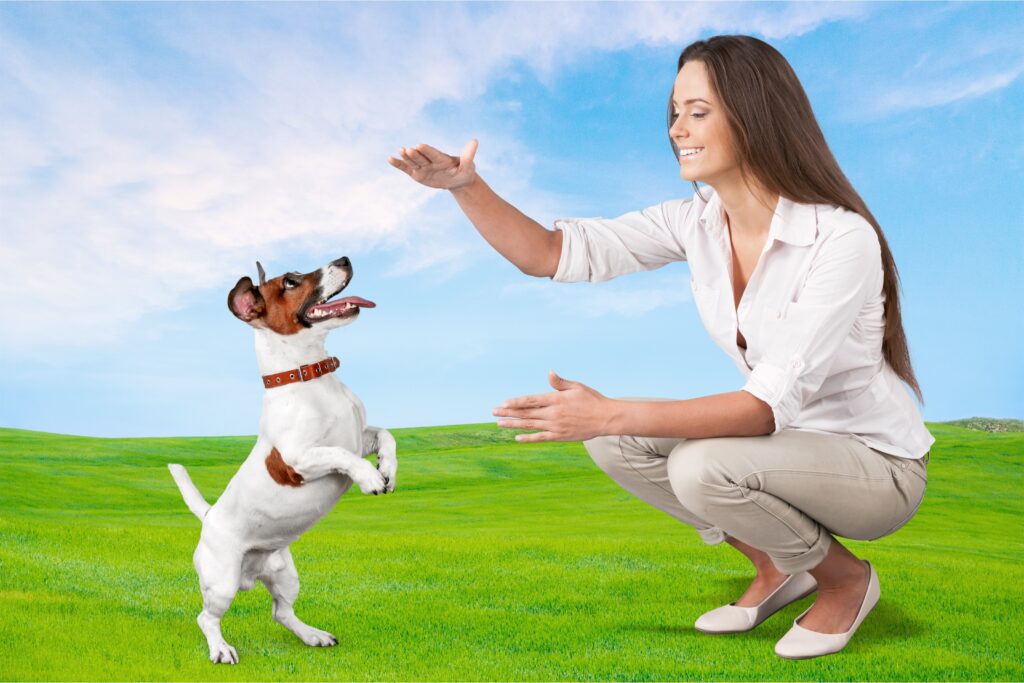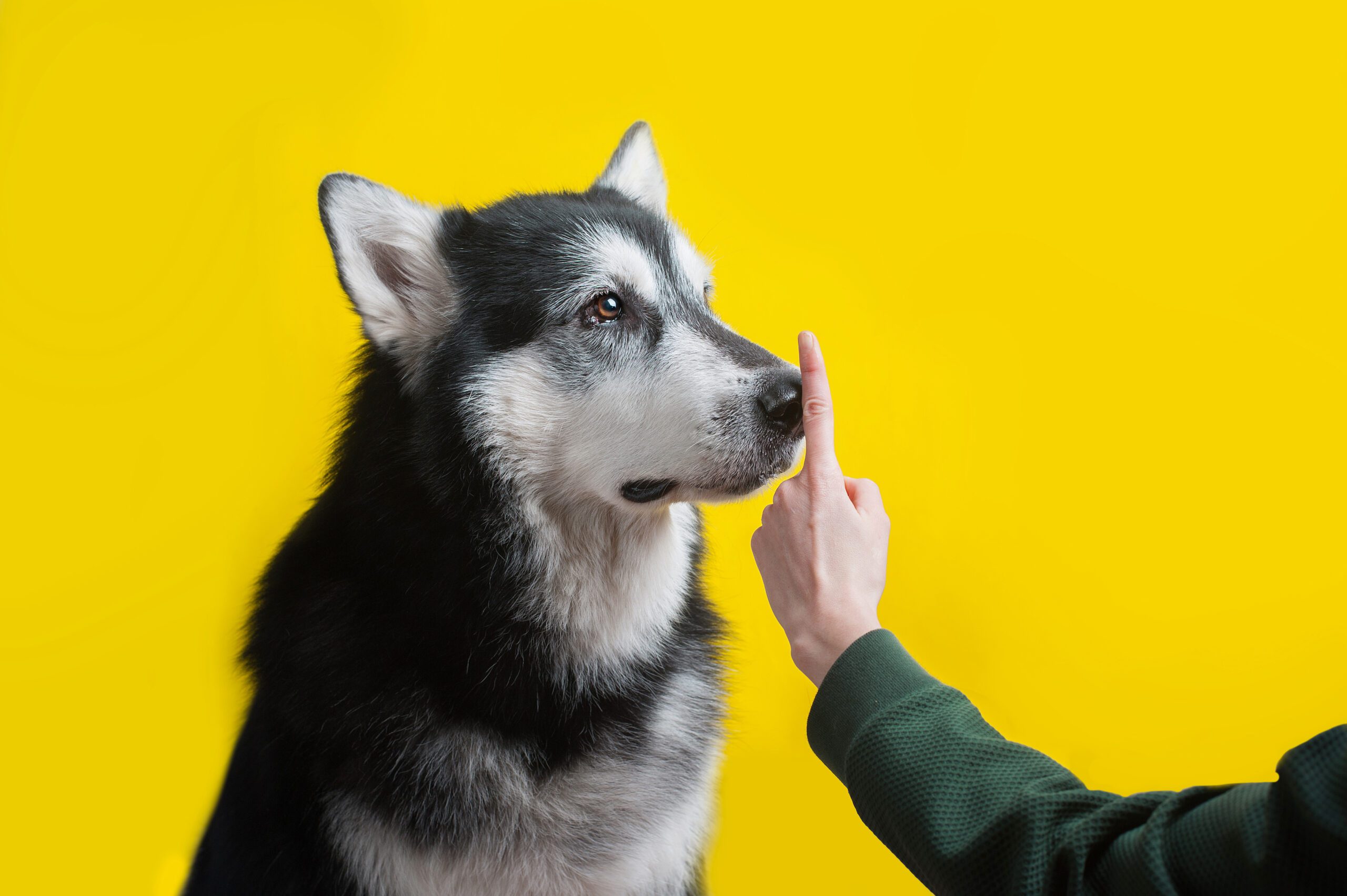
Honoring National Deaf Dog Awareness Week
September is a month of celebrating our furry friends – the same as any other month, for that matter! This week (Sept 24 – 30, 2023) is National Deaf Dog Awareness Week., and we invite you to join us in shining a spotlight on deaf dogs and their unique strengths, abilities and needs while shattering misconceptions and celebrating the incredible companionship they bring into our lives.
Deaf dogs, like any other, are full of love, loyalty, and potential. While they may face unique challenges, their deafness certainly does not define them; rather, it enhances their other senses, making them remarkable and adaptable companions. Whether you’re considering adopting a deaf dog or already have one in your family, this blog will provide insights into their world, offering guidance on care, training, and communication.
Misconceptions & Realities of Deaf Dogs
Misconceptions about deaf dogs often revolve around their behavior and communication abilities, sometimes classifying them as “less adoptable” pets. On the contrary, they impressively rely on their heightened senses of sight, smell, and touch to navigate the world around them. They’re highly capable of communication, forming deep connections, and thriving in loving homes. Understanding their behavior and unique ways of communication is essential for effective deaf dog training and bonding.
Deaf Dog Training & Communication
Training a deaf dog requires patience and understanding, emphasizing positive reinforcement techniques. While traditional verbal commands may not work, hand signals and visual cues become the language of choice. Deaf dogs quickly pick up on these cues, showcasing their intelligence and eagerness to learn. By establishing a clear communication system, you’re creating a strong bond built on trust and cooperation.
Training Techniques:
- Hand Signals: Using consistent hand signals for various commands, like “sit,” “stay,” and “come,” creates a clear and reliable way to communicate.
- Visual Markers: Incorporate visual markers like head nods, thumbs up, or specific body postures to signify desired behaviors.
- Flashlight Training: For low-light situations, you can use a flashlight to signal commands, making communication possible even in the dark.
- Vibrations: Deaf dogs can feel vibrations through the ground, so tapping the ground can serve as cues for specific actions.
- Treat Rewards: Pairing hand signals with treat rewards reinforces positive behavior and incentivizes your deaf dog to respond.

By consistently applying these techniques, you’ll see the remarkable adaptability of your dog as they learn to understand and respond to your cues. Additionally, socialization plays a pivotal role in their development. Deaf dog socialization involves exposure to various people, places, and situations from an early age. This will help them build confidence and easily navigate their world, ensuring a well-rounded and happy life. With the proper training and commitment, your dog can thrive while forming an unbreakable bond with you based on mutual respect and effective communication.
Safety, Health & Enrichment Considerations
Ensuring the well-being of your deaf dog requires attention to specific safety, health, and enrichment considerations tailored to their unique needs. Additionally, maintaining a consistent routine is crucial for their overall well-being. Deaf dogs thrive on predictability and routine, so try to keep their daily schedule as steady as possible. While their heightened senses of touch and sight often compensate for their hearing impairment, providing them with physically and mentally enriched experiences like any other pet is essential.
Health Considerations (for ALL dogs!):
- Routine Eye Checks: Regular eye exams can help detect issues early and prevent potential problems.
- Dental Care: Maintain excellent oral hygiene, as dental health is crucial for overall well-being. Regular brushing and professional cleanings are essential.
- Skin Sensitivities: Deaf dogs can be more sensitive to touch. Regularly check their skin for irritations, rashes, or allergies that might need attention.
- Nutrition: Choose high-quality, balanced food to support their health. Consult your veterinarian for dietary recommendations tailored to your dog’s needs.
Safety Measures:
- Visual Cues: Deaf dogs rely on visual cues, so approach them calmly and within their line of sight to avoid startling them.
- Secure Environment: Create a safe space at home, free from hazards that might pose a risk to their keen senses and curious nature.
- Outdoor Safety: Always use a secure leash and harness when taking your deaf dog outdoors. This ensures they stay close and protected, especially in unfamiliar surroundings.
- Socialization: Introduce your deaf dog to new people, pets, and environments in a controlled and positive manner. Gradually exposing them helps build confidence.
Enrichment Activities:
- Scent Games: Engage their exceptional sense of smell with scent-based games and puzzles, encouraging mental stimulation.
- Tactile Toys: Offer toys with different materials and textures that cater to their sense of touch and keep them engaged.
- Training Challenges: Enrolling them in training classes focusing on visual cues and touch-based commands provides mental enrichment and strengthens your bond.
- Interactive Feeding: Use puzzle feeders or hide treats around the house to encourage mental and physical activity while satisfying their curiosity.
Touching Connections: Walker & Dave’s Journey
Adopting a deaf dog brings a unique set of rewards. They’re known for exceptional loyalty and the ability to form deep bonds with their owners. Despite their impairment, they offer unwavering companionship and a remarkable connection that brightens even the gloomiest days.
Deaf dogs also have a keen sense of observation, often leading to heightened awareness of their surroundings. This heightened sense can manifest in delightful ways as they become more attuned to visual cues and environmental changes. Their ability to communicate through eye contact and body language fosters an intuitive connection between the two of you.
Like any other dog, the joys of adopting a deaf dog include the happiness of playtime, daily walks, and the simple pleasure of having a loving presence by your side—the challenges they overcome, and their resilience are a constant reminder of the power of determination and love.
Consider Walker’s story, shared in The Washington Post, and his journey that exemplifies the incredible bonds that can be forged with deaf dogs.
Walker Cousineau, a 14-year-old with hearing loss, immediately bonded with a 6-year-old deaf pooch named Dave. Walker knew he needed this dog the moment he saw a photo of him on Facebook. The caption on Dave’s adoption photo read, “He’s a 9, but he can’t hear you snore at night.” Their connection was instant and heartwarming.
Walker immediately knew what he would name him: Dave. His mom said he giggled at the line “Hey, Dave, listen up, please!” from the “Despicable Me” movie. The laugh line was delivered by Steve Carell’s character to a misbehaving minion and seemed like a fitting place to find his new dog’s name.
Dave’s journey exemplifies the incredible bonds that can be formed with deaf dogs. Through patience and understanding, Walker and Dave’s friendship is a testament to the special connection that can blossom between a deaf dog and its owner. By opening your home to a deaf dog, you’re providing a loving environment and gaining an extraordinary companion who will touch your heart in ways you might never have imagined. The journey of Walker and Dave showcases the resilience, unconditional love, and deep bond that can flourish between a deaf dog and their adoptive family if given the opportunity.
As we celebrate National Deaf Dog Awareness Week and honor the diversity in the canine world, let’s reflect on the profound impact these remarkable animals have on our lives. By embracing them, we discover the joys of their unconditional love and gain valuable insights into the adaptability, communication, and strength of the human-animal bond. By dispelling misconceptions and celebrating the unique qualities of deaf dogs, we can reshape the narrative and contribute to a more inclusive and compassionate world for all dogs, regardless of their abilities.

